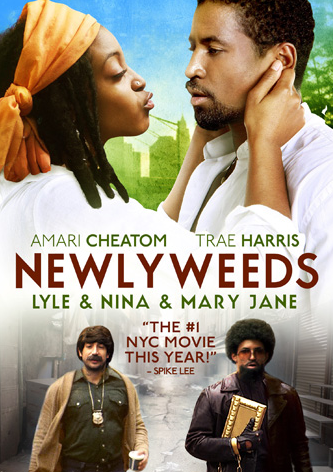 In the gritty, dark rom-com “Newlyweeds,” tragedy and self-destruction tell the story of a couple’s shared love of marijuana. Former New School graduate Trae Harris shines as the female lead, Nina. Since its release at Sundance Film Festival in February, the small indie film has been generating national attention. Spike Lee called it “the number one NYC movie of the year.”
In the gritty, dark rom-com “Newlyweeds,” tragedy and self-destruction tell the story of a couple’s shared love of marijuana. Former New School graduate Trae Harris shines as the female lead, Nina. Since its release at Sundance Film Festival in February, the small indie film has been generating national attention. Spike Lee called it “the number one NYC movie of the year.”
Harris describes filming with Shakah King, the director of “Newlyweeds,”’ as a happy, open experience, although working on a film production was a first for both of them. King contacted Harris to audition, then offered her the lead female role.
“Loved it. Never thought I would,” Harris said about her experience with Shakah King.
The film, which is playing at Film Forum, is far from stereotypical shots of the New York skyline, yellow taxicabs, and subway shots. “Newlyweeds” shows a more realistic view of the city.
“It’s a hyper-naturalistic film, mixed with the surreal,” Noah Isenberg, professor of screen studies at The New School, said. He believes that the biased view of New York, offered to audiences in classic Hollywood films like When Harry Met Sally, only offer a glamorized view of what New York City is really like. “Hollywood tends to flatten and homogenize material until it is easy to digest.”
The realistic roughness, depicted through the witty yet poignant lives of the residents of Bed-Study, shown in “Newlyweeds,” is what Harris said she is the most proud of. ” “Newlyweeds” is reminiscent of Spike Lee films like “Do The Right Thing,” or “She’s Gotta Have It.” Both films are about life in Bed Stuy, where “Newlyweeds” was also filmed – no coincidence considering Lee was one of King’s film professors at New York University.
After many positive reviews and sold-out showings, Film Forum decided to extend the film’s theatrical run an extra week. The film also had successful openings in Los Angeles and Washington D.C.
Harris has performed in many productions and solo performances at notable venues such as The Apollo, Nuyorican Cafe and The Bowery. She recalls her time as a theatre student at The New School as not very positive, and expressed a feeling of being out of her comfort zone during her first years as a student.
“A lot of the discomfort came from being the only visible woman of color in my class,” Harris said. “I didn’t feel like I had an outlet. I didn’t know how to handle it.”
Harris recalled previous roles she was offered while attending The New School: a servant in a classical play, and a non-human character in another. Although Harris was hesitant to use race as a motivating factor during these castings, she said that she felt many visiting professors didn’t know what to do with her.
“Were my professors racist? No, I don’t really think that’s it,” Harris said. “Was I greatly overlooked? Yes, I was. But obviously that had no effect on my career as of now. I have no idea what my other classmates are doing but I am very proud of where I am.”







Leave a Reply